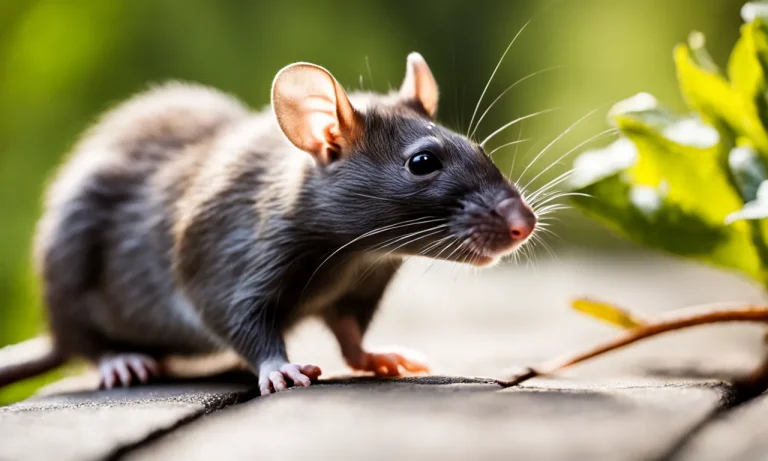Raising backyard chickens can be an extremely rewarding experience. Fresh eggs every morning make all the work worth it. However, dealing with unwelcome visitors like rats can quickly turn your chicken coop into a nightmare.
If you’ve noticed a drop in egg production, you may be wondering: do rats stop chickens from laying eggs?
If you’re short on time, here’s a quick answer: rats can indirectly reduce egg production by stressing out your chickens and making the coop environment unpleasant. However, they don’t directly prevent chickens physiologically from laying eggs.
In this detailed guide, we’ll cover everything you need to know about the relationship between rats and chicken egg production. We’ll look at the ways rats can interfere with laying, how to tell if rats are the culprit, and most importantly, what you can do to get your flock’s egg numbers back up.
How Rats Interfere with Egg Production
Rats can have a significant impact on egg production in chicken farms. Their presence can cause stress to chickens, damage housing and nests, spread diseases, and even consume chicken feed. These factors can lead to a decrease in egg production and negatively affect the overall health and well-being of the chickens.
Stress Out Chickens
Rats are known to be carriers of various diseases and parasites that can harm chickens. The constant presence of rats can stress out the chickens, making them more susceptible to illness and reducing their egg-laying capabilities.
The fear and anxiety caused by rats can disrupt the natural egg-laying process and result in a decline in egg production.
Damage Housing and Nests
Rats are notorious for their gnawing behavior, and chicken coops are not exempt from their destructive tendencies. They can chew through wooden structures, wires, and nesting materials, causing damage to the housing and nests.
This destruction can disrupt the chickens’ nesting habits and discourage them from laying eggs in compromised areas.
Spread Disease
Rats carry various pathogens that can be transmitted to chickens, posing a significant health risk. These diseases can affect the chickens’ overall health, including their reproductive system. Infected chickens may experience a decrease in egg production, or their eggs may be compromised, leading to lower quality or even non-viable eggs.
Eat Chicken Feed
Rats are opportunistic feeders and will consume any available food source, including chicken feed. Their presence in chicken coops can lead to a significant loss of feed, which is essential for the chickens’ nutrition and egg production.
When rats consume a substantial amount of chicken feed, it can lead to malnutrition in the chickens and a decrease in egg-laying.
It is crucial for chicken farmers to implement effective rat control measures to prevent these issues from occurring. Regular inspections, proper sanitation practices, and the use of traps or rodenticides can help minimize the rat population and protect the chickens’ egg production.
Signs Rats Are Impacting Your Flock
If you are a chicken owner, you know how important it is for your hens to lay eggs consistently. However, there are instances when egg production suddenly drops, leaving you wondering what could be causing the problem. One possible culprit that may be impacting your flock is rats.
Rats can cause a variety of issues for your chickens and it’s important to be aware of the signs that indicate their presence.
Sudden Drop in Egg Production
One of the first signs that rats may be affecting your flock is a sudden decrease in egg production. If you notice a significant drop in the number of eggs your hens are laying, it could be due to rats stealing the eggs or causing stress among the chickens.
Rats are known to eat eggs, and their presence can disturb the hens, leading to a decrease in egg laying.
Damage Around Coop
Another sign that rats are impacting your flock is damage around the coop. Rats are notorious for chewing through wood, plastic, and even metal. If you notice holes or gnaw marks on the coop walls or the feed containers, it’s a strong indication that rats are present.
Additionally, rats may create tunnels near the coop, which can further disrupt the chickens’ environment.
Evidence of Rats
It’s important to be able to identify the presence of rats in and around your chicken coop. Look for rat droppings, which resemble small, dark pellets. These droppings are typically found in areas where rats frequent, such as feed storage areas or nesting boxes.
Additionally, you may notice rat footprints or tracks near the coop, especially in muddy or dusty areas.
Changes in Chicken Behavior
Rats can cause stress and anxiety among your chickens, which can lead to changes in their behavior. If your once-friendly hens become skittish or start displaying signs of aggression, it could be a result of the presence of rats.
Chickens may also show signs of distress, such as feather picking or decreased appetite, when rats are around.
It’s important to take immediate action if you suspect rats are impacting your flock. Not only can rats disrupt egg production, but they can also spread disease and pose a threat to the overall health of your chickens.
Implementing rat control measures, such as securing the coop, removing food sources, and using traps or poison, can help protect your flock and ensure they continue to lay eggs consistently.
Getting Rid of Rats in Your Coop
Having rats in your chicken coop can be a nuisance. Not only can they cause damage to your coop and feed, but they can also stress out your chickens and even stop them from laying eggs. Therefore, it’s important to take action to get rid of rats and ensure the safety and productivity of your chicken flock.
Chicken-Safe Raticides
When it comes to dealing with rats in your coop, it’s crucial to use raticides that are safe for your chickens. Many common rat poisons contain toxic ingredients that can harm not only the rats but also your chickens if they come into contact with it.
Look for raticides specifically designed to be chicken-safe, such as those made with ingredients like boric acid or diatomaceous earth. These substances are effective in killing rats but pose no harm to your feathered friends.
Traps
Using traps is another effective way to get rid of rats in your coop. There are various types of traps available, including snap traps, live traps, and electronic traps. Snap traps are a popular choice and can be placed strategically around your coop to catch rats.
Live traps are a humane option that allows you to catch rats alive and release them away from your coop. Electronic traps deliver a quick and humane electric shock to kill rats instantly. Whichever trap you choose, make sure to place them in areas where rats are most likely to frequent, such as near food sources or along their travel routes.
Predators
Introducing natural predators to your coop can help control rat populations. Animals like cats and dogs are known for their hunting instincts and can be excellent rat catchers. If you have a cat that enjoys hunting, consider allowing it access to your coop area.
Additionally, some chicken breeds, such as terriers or certain types of hens, have a natural inclination to hunt rodents. However, always be cautious when introducing new animals to your coop and ensure their compatibility with your chickens.
Block Entry Points
Preventing rats from entering your coop in the first place is essential. Rats can squeeze through small openings, so it’s important to inspect your coop for any potential entry points. Seal up any cracks or gaps in the walls, floors, and roof.
Use wire mesh to cover ventilation holes and make sure your coop’s doors are secure. By blocking off these entry points, you can greatly reduce the chances of rats infiltrating your coop.
Clean Coop Thoroughly
Rats are attracted to food sources, so keeping your coop clean is crucial in deterring them. Regularly clean out your coop, removing any spilled feed or debris that may attract rats. Store your chicken feed in secure containers that rats cannot access.
Additionally, ensure that your coop’s surroundings are free from clutter and overgrown vegetation, as these can provide hiding spots for rats.
Remember, the key to getting rid of rats in your coop is to take a comprehensive approach. Use chicken-safe raticides or traps, introduce predators if suitable, block entry points, and keep your coop clean.
By implementing these strategies, you can create a rat-free environment for your chickens, allowing them to lay eggs in peace.
Returning Your Flock to Peak Laying
As a chicken owner, it can be concerning when your flock’s egg production starts to decline. There are several factors that can contribute to a decrease in egg-laying, and one question that often arises is whether rats can be the culprit.
Let’s explore some strategies for returning your flock to peak laying and address the issue of rats.
Reduce Stress
Stress can have a significant impact on a chicken’s ability to lay eggs. It’s important to create a calm and peaceful environment for your flock. Make sure they have enough space to roam and forage, as this can help reduce stress levels.
Additionally, provide plenty of fresh water, a balanced diet, and protection from predators. Rats can indeed be a source of stress for chickens, as they can cause anxiety and disrupt the flock’s routine.
Implementing effective rat control measures, such as securing feed storage and using traps or deterrents, can help alleviate this stress.
Provide Laying Incentives
Chickens are more likely to lay eggs when they have a comfortable and inviting nesting area. Ensure that your coop has clean and cozy nesting boxes that are easily accessible to your hens. Adding soft bedding, such as straw or wood shavings, can make the nesting boxes even more appealing.
You can also consider placing fake eggs or golf balls in the nesting boxes to encourage your hens to lay. These “incentives” can help establish a routine and reinforce the behavior of egg-laying.
Supplement Light
Light plays a crucial role in a chicken’s reproductive cycle. As the days grow shorter in the fall and winter months, chickens naturally decrease their egg production. However, you can help stimulate egg-laying by supplementing light in the coop.
Adding a timer to provide 14-16 hours of light per day can mimic longer daylight hours and encourage your hens to lay consistently. It’s important to note that excessive light can also be detrimental to your flock’s health, so be mindful of providing a balanced lighting schedule.
Give Flock Time to Recover
If your flock has experienced a period of stress or a disruption in their routine, it may take some time for them to recover and return to peak laying. Patience is key during this process. Allow your chickens time to adjust, and continue to provide them with proper care and attention.
With the right environment and care, your flock will gradually regain their egg-laying momentum.
Remember, while rats can cause stress for your chickens, they are not the sole reason for a decline in egg production. By following these strategies and addressing any potential rat issues, you can help your flock return to their peak laying potential.
For more information on chicken care and management, you can visit reputable sources such as www.backyardchickens.com or extension.umn.edu.
Conclusion
In summary, rats can certainly cause a drop in egg production by creating an unpleasant environment that stresses out your chickens. However, with some diligent pest control and flock management, you can get your chickens laying again.
Focus on excluding rats, reducing stress, and optimizing your coop for laying. Be patient, as it may take some time for your hens to fully recover. But with a little work, your morning omelets will be back before you know it!
We hope this outline gives you a comprehensive game plan for investigating and reversing declines in egg production. Let us know if you have any other questions!






